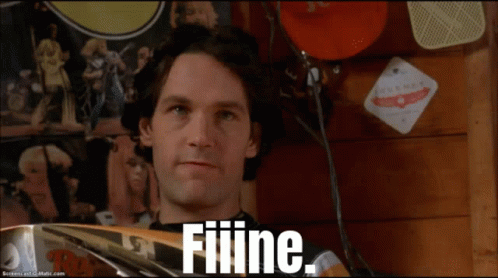Repost: Breaking Up With Amazon (2014)
Cool Daniel doesn't cotton to companies kowtowing, bending the knee, kissing the ring, or otherwise putting profits over morals to appease the human equivalent of a rotting Arby's roast beef sandwich.

Cool Daniel™️ doesn't cotton to companies kowtowing, bending the knee, kissing the ring, or otherwise putting profits over morals to appease the human equivalent of a rotting Arby's roast beef sandwich. Seeing reports of Jeff Bezos giving a million dollars to throw a party for Trump turns Cool Daniel's stomach, and knowing his books helped generate revenue (however miniscule) that may have contributed to this act of cowardice makes him want to break up with Amazon completely.
This isn't the first time I've been angry with Amazon. Almost a decade ago, Amazon went on a review-deleting rampage that made me want to take my ball and go home. The sentiment is different this time around, the anger more focused and pure... but I don't think breaking up with Amazon is doable, at least when it comes to my books. I'll stop shopping there, buying movies from them, and otherwise try to move on to other companies, but they're still #1 when it comes to generating income from my novels.
I'm stuck with Bezos just like I'm stuck with Trump.
But that's okay. As we're saying this year, Cool Daniel™️ embraces the chaos.

Originally published sometime in 2014 (and it shows).
So it has come to this.
Dear Amazon,
I don’t think I like you anymore.
Coldest regards,
Daniel Verastiqui
In the wake of another round of Amazon deleting reviews from one of my books—this time, 12 from Veneer—I started thinking that maybe it was time to reexamine my relationship with the largest online retailer in the world. Ever since ordering Beginning Visual C++ 6 in January of 1999, I have been in love with Amazon. Over the years, I’ve happily poured money into a company that has helped bring e-readers, streaming music and video, and cheap tablets to the masses. At the same time, I easily ignored reports of people losing their entire Kindle library, of “purchased” movies being removed from streaming video libraries, and of reviews getting deleted on a whim.
Because honestly, when it’s not happening to you, what’s the problem?
So as I sat there stewing last night, muttering screw Amazon right in their faces over and over, I began to wonder: is it even possible to break up with a ubiquitous conglomerate like Amazon?
Let’s take a look at some of the ways we can cut Amazon out of our lives completely.
Amazon.com
Alternatives: Rakuten, Newegg, Target, Wal-mart
This will be the toughest habit to break; almost everything I purchase online goes through Amazon. I had to google amazon alternatives to even find out about Rakuten. Joel Lee over at makeuseof has this to say when it comes to general shopping:
Have you heard of Rakuten? Probably not. Have you heard of Buy.com? Most likely, yes. What many people don’t know is that Rakuten is Buy.com. Rakuten bought out the company back in 2010 and rebranded the site, which is about the time that Buy.com fell off the radar. The good news is that Rakuten is a strong adversary to Amazon.
One of the biggest perks of buying from Amazon used to be that they didn’t charge tax. That changed some years ago, making places like Target, Wal-mart, and even Best Buy (if you can get them to price-match) viable alternatives.
For electronics, Newegg has always been my go-to when it came time to build a new computer. They recently introduced Newegg Premier, which includes “free” 3-day shipping, free returns, and no restocking fees.
I have no idea who I’m going to order bulk candy from though.
Amazon Kindle
Alternatives: Nook, Kobo, iTunes
Though they might be the biggest, Amazon isn’t the only electronic book seller in town. Often, when I’m pitching my books to someone, I get asked, “Can I get it on my Nook?” And as I answer, “No,” and watch another sale go down the drain, I think to myself, why don’t they just get a Kindle? For whatever reason, people remain loyal to their e-reader of choice. Personally, buying a book from the iTunes store just felt wrong. Maybe it’s time to give them a shot.
Moving away from Kindle (I have three) is a real bummer. I’ve cut my print books down to about a quarter of what I used to own, preferring instead to have them in digital. It’s a good reminder that putting all of your eggs in any digital basket is probably not a good idea.
Platform- and company-independent print books might be less convenient, but at least you won’t lose them when you divorce Amazon.
Amazon Prime Instant Video
Alternatives: Netflix
With Netflix thinking of raising their monthly subscriptions, I had the crazy idea the other day that maybe it was time to rely solely on the movies provided as part of Amazon Prime. It only took a few minutes of critical thinking to realize that although the two services share a lot of the same movies, Netflix is still the better choice. Watching movies on your Roku, phone, or PC is just easier with Netflix.
I’m not going to miss this part much. Although…
Amazon Instant Video
Alternatives: M-Go, Redbox Instant
I will miss the convenience of paying $19.99 for the HD version of movie that is available for purchase but not quite yet available to rent. Unfortunately for Amazon, Roku always seems to be adding a new service that is capable of renting you movies, often for exactly the same price as Amazon. So long as the streaming quality holds up, it should be relatively easy to transition to a new service.
Amazon MP3
Alternatives: iTunes, Google Play, Spotify, Pandora
If you want to buy MP3s like it’s 2010, then iTunes and Google Play will fill the void left by the Amazon MP3 store. For the more modern music aficionado, Spotify and Pandora have you covered. Since they’re both subscription based, you won’t get fooled into thinking you somehow “own” the content you’ve purchased. Then, one day when Spotify starts forcing you to listen to One Direction, you won’t feel so bad about breaking up with them.
Createspace (An Amazon Company)
Alternatives: Lulu
The primary reason I switched from Lulu to Createspace was because Createspace promised easy integration with Amazon. Their prices are also better on the actual printing of books, and their shipping costs when buying direct are actually reasonable.
Lulu is still a great alternative though, and they offer ISBNs and listings on Amazon and Barnes & Noble.
Of course, printing your book with Lulu but selling it through Amazon still gives Amazon a cut of the action. It’s less than the double-dip they get with a Createspace/Amazon setup, but if you want to box them out completely, you’ll need to stick with other online retailers or sell copies directly from Lulu.
There’s also no shame in selling copies out of your trunk at a busy intersection. No fun, but no shame either.
Amazon Kindle Direct Publishing
Alternatives: Nook, Kobo, iTunes, Smashwords
Just thinking about all the alternatives to Amazon KDP makes me wonder why I ever thought exclusivity would be a good idea. Most independent publishers talk about making your books available in as many places and formats as possible for maximum exposure. Amazon counters this by offering KDP Select, which allows readers to “borrow” your book and allows you to run free/discounted book promotions. Of course, KDP select requires exclusivity.
I guess I chose to go exclusively Amazon with my books for one reason: to drive all traffic to one page. That page is where I’d concentrate all of my efforts into getting reviews. What’s better? A few reviews at several retailers? Or 30 reviews at Amazon?
Of course, this plan is based entirely on the idea that Amazon won’t arbitrarily delete reviews.
In Sum
This post is titled Breaking Up With Amazon because I thought it would be funny to characterize my relationship with Amazon as something more than company and consumer.
It’s easy to let brand / company loyalty turn into something unhealthy. It’s why we have the term fanboy.
What’s difficult is remembering that companies are built to make money, not the make the world a better place. Amazon is not your friend. Google is not your friend.
Even Friendster isn’t your friend. When’s the last time you even heard from them?
As an independent publisher, your job is to get your books into as many hands as possible using the tools available at the time, whether that’s Amazon KDP or Kobo or Nook Press. Tying yourself to any one of those companies or technologies puts you at their mercy. Your books will live forever, but companies will come and go.
The same applies for where you spend your money. Amazon is convenient, yes, but when your library of 500 Kindle titles suddenly disappears, you’ll find yourself at Half Price Books looking for used print copies so you won’t get burned again. What about the movies and MP3s you’ve “purchased?” If they’re all in the cloud, and the cloud goes away, what then?




